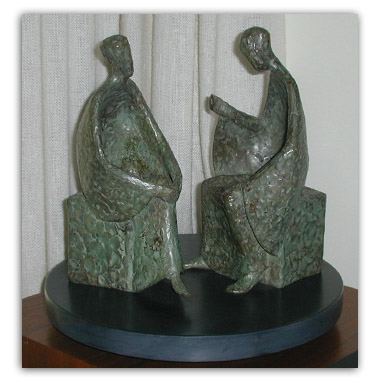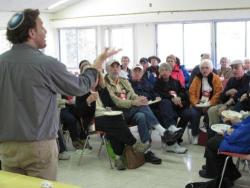Embassy Letter on Kotel Rubs Salt in the Wound
By Josh Nathan-Kazis
An Israeli embassy effort to address the concerns of non-Orthodox Jewish leaders regarding the treatment of some worshippers at Jerusalem's Western Wall has instead inflamed many of them.
The embassy's response — to a letter-writing campaign by Conservative Jews and others protesting the treatment of female worshippers who don't abide by the strictures of the Orthodox authorities controlling the site — stressed the need for compromise at the Western Wall. In the December 21 letter e-mailed to many who wrote, the embassy's office of public affairs cited the existence of Robinson's Arch, an alternative prayer site designated for egalitarian prayer in an archaeological park adjacent to the Western Wall Plaza.
But David Lissy, executive director and CEO of the Masorti Foundation for Conservative Judaism in Israel, reflected the views of many who were contacted, dismissing the communiqué as "largely a non-response."
"It doesn't deal head-on with any of the critical issues which need to be addressed," he said. "I think the government of Israel is failing to appreciate the degree to which the majority of Jews around the world care about these kinds of things."
Conservative Jewish leaders called for the letter-writing campaign to Ambassador Michael Oren after Nofrat Frenkel, an Israeli medical student and observant Conservative Jew, was detained and interrogated by Israeli police in November while wearing a prayer shawl and carrying a Torah during a prayer service held by Women of the Wall, an activist group, in the women's section of the Wall.
In January, Anat Hoffman, director of Reform Judaism's Israel Religious Action Center and leader of Women of the Wall, was taken to a Jerusalem police station, where she was interrogated and fingerprinted, and informed that she might be charged with a felony for violating rules of conduct at the Western Wall.
The two incidents sparked angry reactions from liberal Jewish movements in America and Israel. In a joint communiqué, leaders of the Conservative movement accused Oren and his government of "permitting ultra-Orthodox extremists to control public life and block other caring and devoted Jews from fully realizing their spiritual quest."
Conservative leaders dispute the embassy's characterization of Robinson's Arch as a fair compromise, and argue that the embassy's response was too narrow in its focus. Lissy's organization has urged supporters to complain to the embassy about its letter, and other Conservative groups say they are planning their own responses.
Oren has also come under fire for misinforming a December gathering of Conservative leaders about Frenkel's treatment when he assured them that police had simply led her away from the Western Wall. Oren later blamed his government for having given him "incomplete" information about what had happened, and ordered "a full and thorough inquiry" on the matter, which would be forthcoming "within a couple of days." His spokesman said in early January that the inquiry had been completed, but could offer no information on its contents.
Reached January 26, a spokesman for Oren declined to comment on the response to the embassy's communiqué or to provide information on the results of the inquiry Oren ordered.
In its communiqué, the embassy alluded to a 2003 decision by Israel's Supreme Court that disallowed women from reading from the Torah or wearing prayer shawls at the Western Wall. In its ruling, the embassy noted, the court ordered the state to prepare Robinson's Arch "to host egalitarian services that encourage both men and women to wear tallit and read from the Torah."
"The current situation provides all Jews with an outlet for religious expression next to Judaism's most sacred site," the embassy statement asserted.
But Conservative leaders noted that the prayer site at the arch is available only until 10:30 each morning, in contrast to the main Western Wall site, which is open for prayer 24 hours a day. Services at the arch must be scheduled beforehand, and anyone arriving or leaving late is charged an $8 entry fee. Unlike the main wall site, Robinson's Arch lacks prayer equipment such as arks, Torah tables, chairs, prayer books and Torahs, which must be brought in by worshippers. It has no indoor facilities.
"The letter implied that, 'Hey, look, there's a perfectly good place for people to go and daven at Robinson's Arch…and the answer is, it's not a perfectly good place," said Andrew Sacks, director of the Rabbinical Assembly in Israel, an organization of Masorti rabbis. "It's severely restricted."
"The wall as it's been understood by the Jewish people does not mean Robinson's Arch," said Eric Yoffie, president of the Union for Reform Judaism. "It just doesn't." Yoffie did not dispute the embassy's explanation of the legal status of Robinson's Arch, but said that he hoped the arrangement would be revisited.
Women of the Wall also disputed the notion of Robinson's Arch as an alternative prayer site for them. In a written response to the embassy's letter, members of the group said, "We do not hold egalitarian services…. Our rights can be realized in the women's section at the Kotel; this is what we have asked and continue to ask…. To deny us this practice at the Kotel is not 'compromise,' as the Embassy response would have it — where is the concession on the part of those who vilify, deny, silence, and banish us?"
Some Conservative leaders thought the embassy's letter focused too narrowly on the issue of the Western Wall — or Kotel, as it's known in Hebrew — and did not respond to the larger concerns that the movement's letter-writing campaign had raised. "Our letter did not exclusively address issues of the Kotel, but rather sees the Kotel as one example of… the increasing haredization of Israel, and the increasing alienation of the majority of the world's Jews from not only religious participation, but from any freedom of religious experience in the State of Israel," said Julie Schonfeld, head of the Rabbinical Assembly, the organization of American Conservative rabbis.
For some, the original slight of Frenkel's detainment still rankles, and the embassy's response simply didn't go far enough. "I can't get my head around the notion of any Jew being arrested… anywhere in the Jewish state for wearing a tallit," said Rabbi Steven Wernick, executive vice president of the United Synagogue of Conservative Judaism. "Even if one were to accept the government's response here fully, there just have to be better ways to handle this kind of civil disobedience… and none of those issues were addressed by this letter."
Contact Josh Nathan-Kazis at nathankazis@forward.com
 Dear Chevreh,
Dear Chevreh,

 as host by saying "
as host by saying " With wishes for a week of peace and music in Israel and everywhere else, full of amazing things we've helped make happen through our life as a vibrant, dream-worthy community.
With wishes for a week of peace and music in Israel and everywhere else, full of amazing things we've helped make happen through our life as a vibrant, dream-worthy community.
 It's Happening at the...
It's Happening at the... 

 (Each month we will feature another staff member from the Hannaton Educational and Spiritual Center.)
(Each month we will feature another staff member from the Hannaton Educational and Spiritual Center.) 












